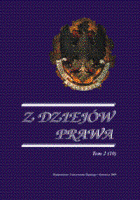Geneza regulacji prawnej interpelacji poselskich w Sejmie Śląskim w latach 1922-1939
The origins of legal parliamentary interpellation in the Silesian Sejm between 1922 ad 1939
Author(s): Józef CiągwaSubject(s): Law, Constitution, Jurisprudence
Published by: Wydawnictwo Uniwersytetu Śląskiego
Summary/Abstract: The lack of the act on an internal system of the Silesian Voivodship, which, according to the 14th article of the organic status, is to regulate the details of the right to interpel, made the regulations of the sessions of the Silesian Sejm define it in subsequent terms of office. The studies of the issue in question made use of the archive materials of the Team no 17 (the Silesian Sejm), especially the session protocols of the Regulation Committee preparing the projects of regulations, parliamentary prints, stenographic reports from plenary sessions of the Silesian Sejm. Besides, these constituted the regulations of the sessions of the Legislative Sejm and the Sejm of the Republic of Poland of the I.V terms of office. The analysis conducted makes it clear that the regulations on interpellations, included in four regulations of the Silesian parliament, i.e. article 44 of two regulations of the Silesian Sejm I (from 13 October 1922 and 31 January 1923); in article 24 and 25 of the regulation of the sessions of the Silesian Sejm II (from 17 June 1930), amended on 24 September 1935) and finally the article 84 of the regulation of the Silesian Sejm IV (from March 11 1936) were far from originality, constituting almost the copies of the regulations of both the Legislative Sejm (regulation I of the Silesian Sejm) and bichamber Sejms of the Second Republic of Poland preceding them. Some, however, insignificant degree of originality can be noticed only in the fragments of the principles of regulations of the Silesian Sejm I and II which formulated the conditions of the acceptability of discussions on interpellation and the answer to it. Silesian rules, in this respect, constituted some extras in comparison to the principles of the Poland-wide regulations as the latter did not include them. A reception of Poland-wide interpellation patterns concerned only the basic rules. Specific resolutions had to be different by nature. Thus, the Silesian regulations involve other addressees of interpellation, instead of the Government and the Prime Minister, the Silesian Voivode and the Voivodship Council. There were different terms of expecting the explanations of interpellation bodies, i.e. 30 days in the regulations of the Poland-wide Sejms, 3 weeks in Silesian regulations, a varying extent of interpellation support, 15 signatures in the regulations of the Republic of Poland Sejms, 7, 5 or 3 in the regulations of the Silesian Sejm. The Silesian solutions, original in their details, were the necessity deriving from the specificity of the Silesian Sejm as such and the fact that interpellations of the Silesian Sejm could refer to exclusively the issues of the Silesian Voivodship, not the whole area of the Republic of Poland.
Journal: Z Dziejów Prawa
- Issue Year: 10/2009
- Issue No: 2
- Page Range: 101-126
- Page Count: 26
- Language: Polish

